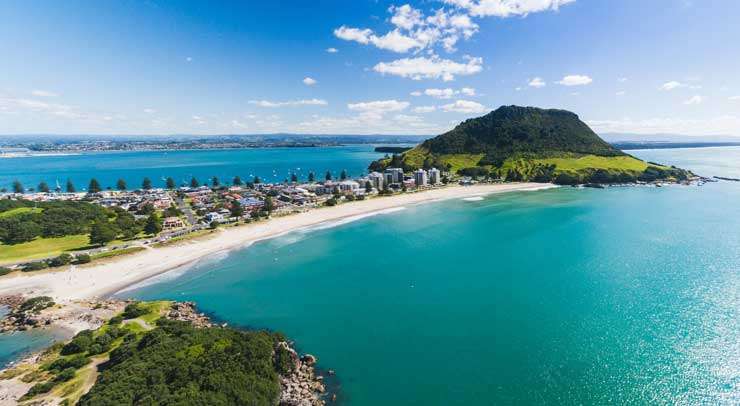Owning a bach is as Kiwi as jandals and Jellytips. While some families can afford to have their beach house lying empty much of the year, the economics for many means finding a way to monetise their investment.
That’s usually letting it out on the short-term rental market in the peak season over summer. For the week from December 30, 2021, to January 7, holiday rentals for Mt Maunganui range up to $1,200 per night or more , which can go a fair way to paying the holding costs on holiday homes.
Dave Collins, owner of Bach Stay NZ, a short term rental agency in Mangawhai Heads, says owners often forgo staying at their own bach for the peak Christmas/New Year period because that’s when they can get the best nightly or weekly rates for their homes.
“With a reasonable bach in Mangawhai you should be able to make $20,000 to $25,000 a year before commission,” says Collins. “That will certainly help to cover a chunk of costs such as rates and mortgage. It can be the difference between people being able to afford a bach (or not).”
Start your property search
Collins’ agency charges 20% to manage the listing, and to arrange cleaning between lets. A local bach owner himself, he says many owners live in Auckland and it can be hard work for them to do turnovers between short term rentals.
Real estate agent Gordon Turner, owner of First National Whangamata, which both sells and lets baches, says of the 120 homes in the company’s short term pool, around 60 would be rented at any time in the peak/shoulder season of December/January.
Prior to the most recent update to the Residential Tenancies Act (1986), which restricts the ability of bach owners to let, many would house long term tenants over the winter, and reopen for short term lets in summer.
Homes let as rental properties over winter could earn about $380 to $440 a week ($19,760 to $23,400 a year), says Turner, but there are very few available.

Mt Maunganui in Tauranga. Prices for short-term rentals in the suburb shoot up over the summer holiday period. Photo / Getty Images
The shortage of long term rentals is a serious problem for Whangamata, Turner says. “It's a serious problem for the cafes, who can't get staff, and for the kids who want to come along and work the summer. There is nowhere (to rent). There isn’t even a postage stamp. We don’t even have a motor camp. That’s been bought and is being subdivided.”
Anyone buying a bach can expect to spend upward of $1m in desirable holiday spots such as Mangawhai and Whangamata, say both Collins and Turner.
A 1970s two-bedroom unit on Barrowclough Road, in Whangamata, recently sold for an undisclosed amount after being listed with price expectations of more than $1m. While the property was in need of a makeover it was close to the marina, and Turner had expected it to be bought by an Auckland-based boat owner.
Many bach owners manage their properties themselves, and list them on multinational holiday accommodation websites such as Airbnb and Booking.com. The New Zealand brand Bookabach is still operating but now owned by Expedia Group, which also runs Vrbo, a well-known name overseas. Bachcare, which provides listings and bach management is also now foreign owned.

A 1970s unit in Whangamata recently sold for an undisclosed price. Photo / Supplied
The big overseas booking agencies bring custom. But they can also bring nightmares. Bach owners sometimes find that when a disagreement arises Airbnb customer service staff automatically refund the customer, and sometimes bach owners can be banned with no recourse following complaints.
While bach owners have often let long term over the winter, changes to the RTA in February 2021 have led to some removing their baches out of the long term pool over winter.
The issue is that landlords can no longer end a periodic tenancy without cause, and tenants can choose if they want fixed term tenancies to roll into periodic ones. That means owners can’t take their bach back for use by the family or short term tenants over the summer, says Alana Kalinowski, senior solicitor and Smith and Partners. “The problem is that under the new act, it is only the tenant who can give notice not to continue the tenancy past the fixed-term end date. The term ‘fixed-term’ is therefore a misleading under the current act.”
A landlord can only give notice for the residential tenant to leave in limited circumstances, says Kalinowski. “In the circumstances [of a bach owner wanting it back for short term lets or family use] the only reason could possibly be that the owner or a family member requires the property as a principal place of residence for at least 90 days,” she says. “Principal place of residence really means their actual home, and if they maintain a house somewhere else and live there more than at the bach, the bach is not going to be considered their usual place of residence.”
Some bach owners have considered using an exemption in the RTA, which allows long term tenants to be evicted if the property is being converted into a commercial premises. That is unlikely to be relied upon to terminate a residential tenancy in the case of holiday houses, says Kalinowski.














































































